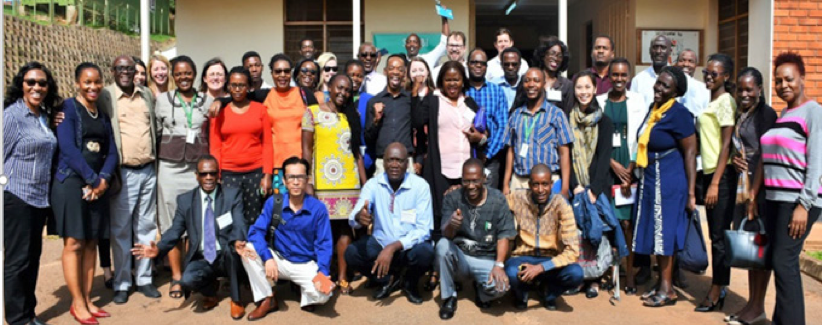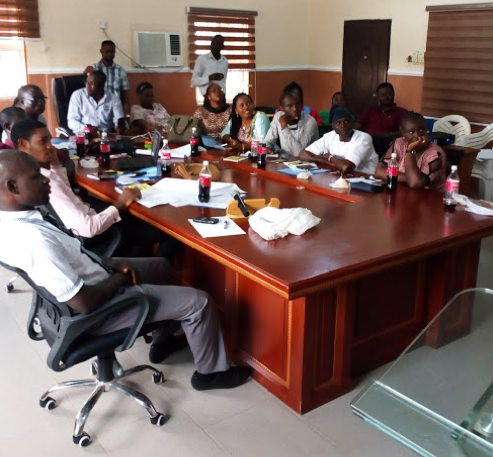Sitting and talking with other people living with HIV at a health facility in Uganda, Zane* no longer felt alone. Unlike many of the others there who remained on efavirenz (EFV), he had recently switched to a new treatment regimen that includes dolutegravir (DTG) and could not believe how much better he felt. On DTG, he had more energy to hang out with his friends, participate in sports and he was able to focus in school in ways that he couldn’t when he was taking EFV. For several years, the Clinton Health Access Initiative, Inc. (CHAI) and other partners have worked to bring the highly optimal DTG, a best-in-class medicine, to market at an affordable price to improve the quality of life for millions of people living with HIV, just like Zane.
“We believe that engagement with the community is absolutely essential to achieving lasting impact in the fight against HIV,” said Carolyn Amole, Senior Director of HIV Access Programs at CHAI. “Partnering with communities of people living with HIV is the right thing to do because, as HIV activists have been teaching us for years, ‘Nothing about us, without us.’ Partnering with communities is also highly effective. There are countless examples of failed or slow efforts to introduce new products because of a lack of community involvement. Further, community collaboration on new product introduction makes sense from a sustainability perspective, because people living with HIV will be there long after all the NGOs have packed up. We are so grateful for the partnership and the leadership of HIV communities, and look forward to continuing to collaborate with the people and governments we aim to serve.”

Members attend the Annual Optimal ARV CAB Meeting in Uganda, in May 2018.
Creating the Community Advisory Board
The meeting Zane attended in Uganda was organized by a group called the Optimal ARV Community Advisory Board (CAB). With encouragement from a strong network of civil society leaders and support from donors, such as Unitaid, CHAI, in partnership with AfroCAB and HIV i-Base, created the board in 2016 as a core part of its HIV treatment optimization work. It has since become an integral part of CHAI’s work in supporting introduction of, and building demand for, HIV treatment products.
By definition, a CAB usually consists of individuals from the general public who meet with representatives of an institution to relay information from the community. Using AfroCAB’s network of civil society organizations across Africa and Asia, 17 community members across 11 countries – Benin, Togo, Senegal, Cameroon, Cambodia, Malawi, Kenya, Nigeria, Uganda, South Africa and Zimbabwe – were selected to serve on the Unitaid-CHAI Optimal ARV CAB to support demand generation for new and better HIV treatment regimens and strengthen the community’s role in how these regimens are planned and rolled out.
“The Optimal ARV CAB is a group of highly motivated, passionate individuals whose main goal is to see people living with HIV have rapid access to better tolerated and more robust ARVs,” said Kenly Sikwese, AfroCAB Coordinator. “The community response and push for DTG is astonishing. They are demanding access, working to find solutions, and are a key driving force to the rapid adoption and availability of the product at both the global and country level.”
Engaging on a Country Level
At the annual CAB meeting in May 2018, several CAB members shared experiences about visiting facilities in their countries and hearing both the challenges that many patients are facing on EFV, and the success stories of patients, like Zane, who were able to switch to DTG in part as a result of the CAB’s work. In sharing these experiences and identifying solutions to address specific challenges through consultations, treatment literacy trainings, workshops, and materials, CAB members have been able to build demand among people living with HIV so that everyone can experience the benefits of DTG and access the information they need to make decisions about their health.
For example, in Zimbabwe, CAB members held five regional awareness meetings with networks of people living with HIV to ensure they are well-informed about HIV treatment options and can advocate for access to more effective regimens, such as those including DTG. In one of these meetings, a young person living with HIV requested to have a separate meeting for youth to safely voice their experiences, which resulted in another gathering with 65 young people in attendance from across the country. Many young people were able to find support from other youth. For example, one attendee was able to find others in similar situations after sharing an experience with EFV: “I took EFV at night and I would hallucinate. I could see the bed spinning and other things that did not exist.”
CAB members in many countries are also directly engaging with the community to develop information, education, and communication materials to improve civil society’s understanding of new HIV treatment options and generate demand for new optimal products. For example, Nigeria CAB members convened a meeting with their community to create treatment literacy videos that will be distributed and played in health facilities in early 2019.

Stakeholders meeting in Nigeria for adaptation and development of patient literacy materials.
“Civil society should serve as the voice for the community by advocating and demanding optimal products for those who need it,” said Buki Ayinde, a Nigeria CAB representative. “We also have a role to play in ensuring communities are educated and informed about treatment optimization, which is why we are creating these videos.”
Looking to the Future
CHAI-Unitaid Optimal ARV CAB members are already beginning to organize more treatment optimization workshops and consultation meetings in 2019 to further strengthen partnerships and build demand for access to optimal HIV treatment. As they continue to work with partners to provide unique perspectives on barriers and opportunities within the HIV space, they also recognize the need to develop even more innovative solutions to address some of the most complex challenges in order to bring the world one step closer to ending HIV and helping people living with HIV, like Zane, achieve the best quality of life possible.
*Name changed to protect identity





